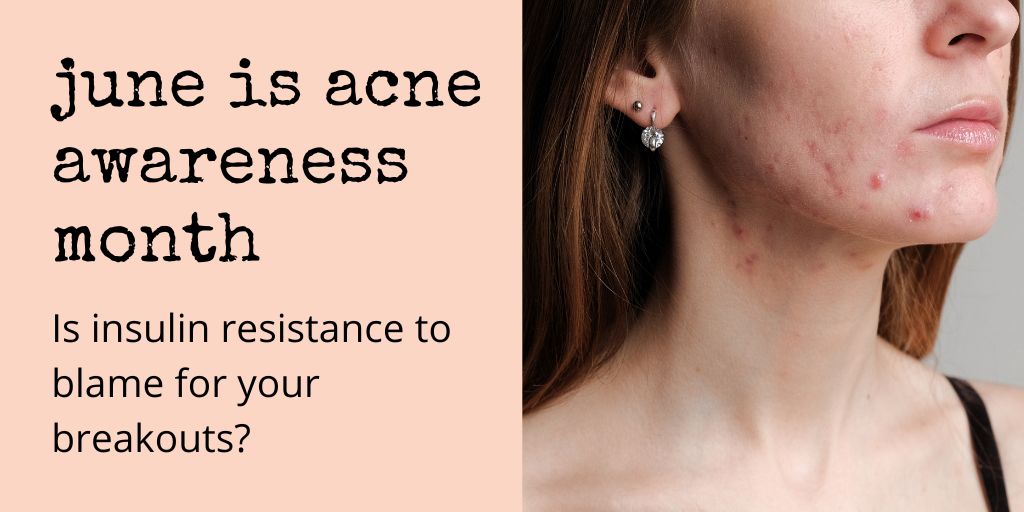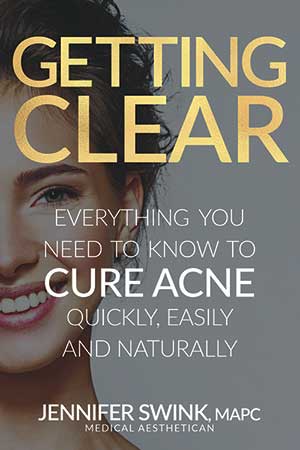
There are many variables contributing to the cause of acne. Most of us have heard of one of the biggest factors, hormone imbalance.
What causes hormone imbalances that contribute to acne breakouts?
The answer is insulin resistance, which is also known as metabolic syndrome. According to some studies, as many as 88% of Americans may be suffering from this condition to some degree.
What is insulin?
Insulin is a hormone released by your pancreas that helps glucose (sugar) enter into your body’s cells where it’s used for energy. The liver also produces and stores glucose in times of need, such as when you’re fasting.
What is insulin resistance?
Insulin resistance occurs when the cells don’t react to insulin, and thus, don’t absorb glucose, leading to excessive sugar in the blood. Over time, the pancreas tries to regulate blood sugar by producing more insulin. Eventually, it can wear out and not be able to produce enough insulin anymore. This can cause blood sugar levels to increase, sometimes to the point of diabetes.
Ok, so how does insulin resistance cause acne?
- Insulin resistance can lead to high sugar levels in your blood, increasing inflammation and the level of free testosterone, making your skin oilier and more prone to breakouts (Oil + Inflammation = acne).
- Increased insulin levels can also trigger the production of the IGF-1 hormone, which stimulates sebum production, resulting in oilier skin.
- Stress, and the hormone cortisol that’s released during stressful periods, can increase insulin resistance and potentially worsen breakouts.
- Metabolic syndrome is a crucial component of polycystic ovarian syndrome.
- A deficiency in Vitamin D, which acts like a hormone, can accelerate insulin resistance.
Insulin resistance is linked to other health issues such as type II diabetes. It’s important to note that insulin resistance, while serious, is reversible if addressed in time. Moreover, it contributes to other unwanted skin issues like early or excessive collagen loss causing wrinkles, hyperpigmentation, and may exacerbate conditions like eczema, psoriasis, and rosacea due to chronic inflammation.
Getting Clear: Everything You Need To Know To CURE ACNE Quickly, Easily, and Naturally
GETTING CLEAR IS THE BOOK FOR ACNE SUFFERERS WHO HAVE TRIED CONVENTIONAL ACNE TREATMENTS AND FAILED.
Jennifer Swink, top-ranked medical aesthetician, helps you understand the underlying causes of your acne and how to cure it quickly, and permanently.
Factors that contribute to insulin resistance include
- Obesity, especially abdominal obesity
- A sedentary lifestyle
- A diet high in carbohydrates, especially those high on the glycemic index
- Health conditions like nonalcoholic fatty liver disease and polycystic ovary syndrome
- Smoking
- Ethnicity (higher risk in African, Latino, or Native American individuals)
- Age (risk increases after 45)
- Hormonal disorders like Cushing’s syndrome and acromegaly
- Certain medications including steroids, antipsychotics, and some HIV medications
- Sleep problems like sleep apnea
- A family history of diabetes
- Having had gestational diabetes
What are the symptoms of insulin resistance?
Often, insulin resistance presents with no symptoms and can only be discovered through blood tests. The tests you can ask for are the fasting plasma glucose test and the Hemoglobin A1C test. These two tests together can provide a comprehensive picture of your glucose levels.
Even if blood tests reveal normal ranges, if you are eating a diet high in sugar and processed carbohydrates, you can be sure it is contributing to your acne.
The evil of sugar in all its forms
Sugar in all its forms contributes to insulin resistance. There are 61 different names for sugar. Some of the more commonly recognized ones include agave nectar, honey, cane sugar, corn syrup, dextrose, fructose, sucrose, and fruit juice concentrate. Even artificial sweeteners like aspartame, saccharin, stevia, and sucralose can cause blood sugar spikes, raise insulin levels, and alter the balance of your gut bacteria, causing inflammation and hormone disruption.
How do I prevent/reverse insulin resistance naturallY?
- Exercise!
- Eat a healthy diet. Think fruits, vegetables, whole grains, fish, nuts, beans, legumes, and other lean protein.
- Maintain a healthy weight



